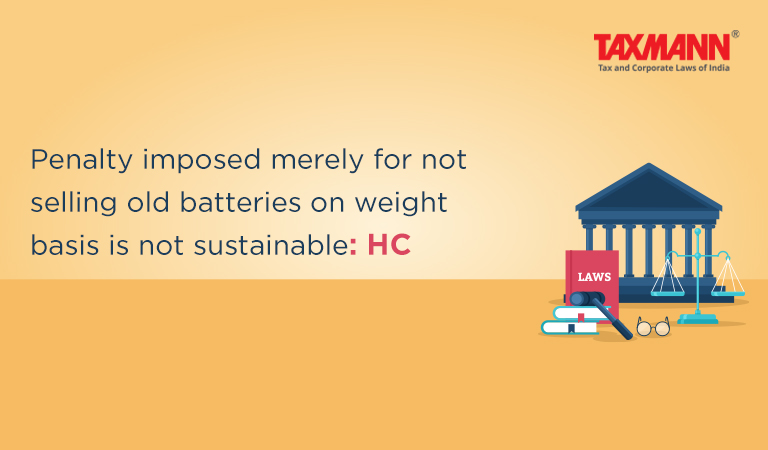Penalty imposed merely for not selling old batteries on weight basis is not sustainable: HC
- Blog|News|GST & Customs|
- 2 Min Read
- By Taxmann
- |
- Last Updated on 6 January, 2023

Case Details: Ganpati Battery Traders v. State of U.P. - [2023] 146 taxmann.com 49 (Allahabad)
Judiciary and Counsel Details
-
- Rohit Ranjan Agarwal, J.
- Anil Prakash Mathur for the Petitioner.
- C.S.C. for the Respondent.
Facts of the Case
The petitioner is engaged in the business of buying and selling old batteries. They were transporting a truckload of these batteries for sale when it was intercepted by the Department’s Mobile Squad in Unnao. The truck was detained for verification under Section 20 of the IGST, 2017 in conjunction with Section 68(3) of the CGST, 2017. The driver of the truck was given a notice and the petitioner submitted a reply.
The Assistant Commissioner (Mobile Squad) then issued an order imposing a penalty on the petitioner, claiming that the goods were sold based on the number of pieces rather than by weight. The petitioner paid the full penalty and the truck and goods were released. They appealed this decision to the Appellate Authority, but the appeal was rejected.
The petitioner then filed a writ petition with the High Court of Allahabad, arguing that they had only purchased the batteries by the piece and had sold them on a per-piece basis, not by weight. They also stated that there had been no concealment on their part as they had provided a correct description of the goods in the truck invoice, which distinguished between large and small damaged batteries.
High Court Held
The Allahabad High Court observed that the petitioner had provided complete description in the tax invoice and consignment note about the transportation of damaged batteries, both large and small. The High Court set aside the orders issued by the Assistant Commissioner and the Appellate Authority, stating that the Department had wrongly detained the petitioner’s truck and goods and imposed a penalty.
Disclaimer: The content/information published on the website is only for general information of the user and shall not be construed as legal advice. While the Taxmann has exercised reasonable efforts to ensure the veracity of information/content published, Taxmann shall be under no liability in any manner whatsoever for incorrect information, if any.

Taxmann Publications has a dedicated in-house Research & Editorial Team. This team consists of a team of Chartered Accountants, Company Secretaries, and Lawyers. This team works under the guidance and supervision of editor-in-chief Mr Rakesh Bhargava.
The Research and Editorial Team is responsible for developing reliable and accurate content for the readers. The team follows the six-sigma approach to achieve the benchmark of zero error in its publications and research platforms. The team ensures that the following publication guidelines are thoroughly followed while developing the content:
- The statutory material is obtained only from the authorized and reliable sources
- All the latest developments in the judicial and legislative fields are covered
- Prepare the analytical write-ups on current, controversial, and important issues to help the readers to understand the concept and its implications
- Every content published by Taxmann is complete, accurate and lucid
- All evidence-based statements are supported with proper reference to Section, Circular No., Notification No. or citations
- The golden rules of grammar, style and consistency are thoroughly followed
- Font and size that’s easy to read and remain consistent across all imprint and digital publications are applied



 CA | CS | CMA
CA | CS | CMA
